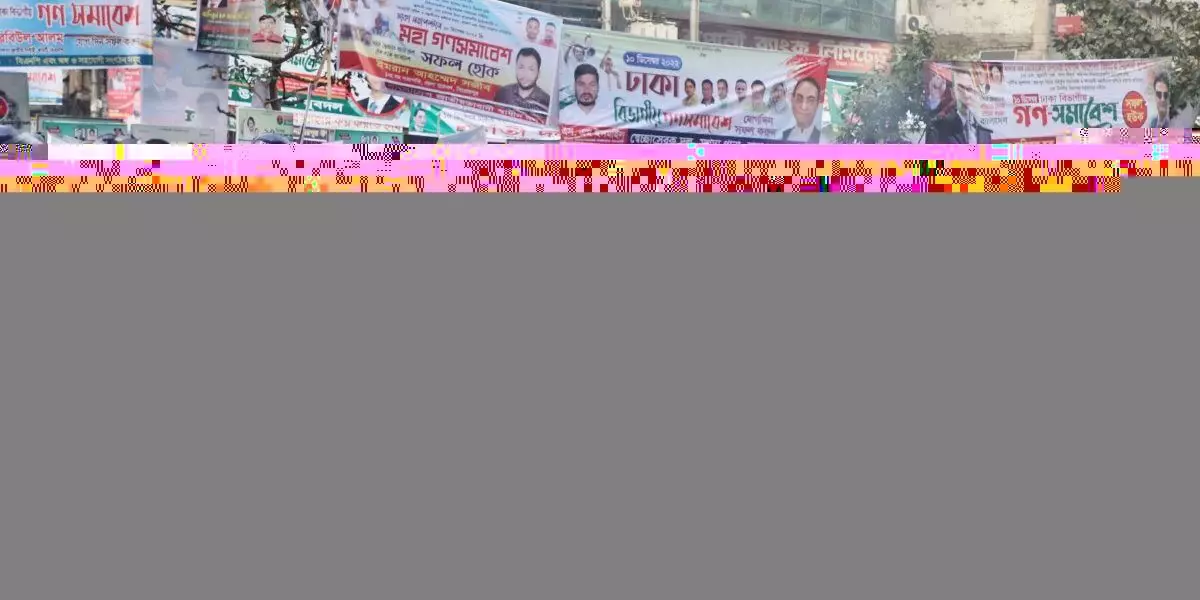Malicious maneuverings?
The feverish pitch of the election mode in Bangladesh has created a space for certain fundamentalist opposition forces to unleash destabilising attacks on the incumbent government

The direct entry of principal opposition political outfit, the Bangladesh Nationalist Party (BNP), into the political fray has taken a violent recourse, from October 28, to the rapidly changing landscape in runup to the general elections scheduled in January next year. The phase after October 28 saw a marked change in the campaigning of the upcoming polls when the BNP and the ruling Awami League (AL) cadres clashed, leading to a series of arrests and deaths. Equally worse is the trend of arson and torching of public transport by the agitating political groups, which continues even today. Participation by the banned Jamaat-e-Islami (JeI) cadres in the protest rallies has further compounded the situation. JeI, which was thought to have been dormant and gone underground, resurged with fury in an attempt to occupy the political space. This said, the pattern of arrests and violence, which began in end October, is still going on and there seems to be no end in sight. So far, at least 19 buses have been burnt, and more than 7,835 BNP cadres and other miscreants arrested. At the time of writing this piece, the BNP Vice Chairman (VC) Shamsuzzaman Dudu was apprehended in the wee hours of November 6. Earlier, BNP heavyweights including Mirza Fakhrul Islam Alamgir and other party senior leaders had already been put behind the bars. Their bails were refused and many others were also put on remand.
Significantly, what started as a one-point demand rally reiterating the resignation of the Hasina government before the elections, aiming for the same to be held under a neutral caretaker government, has now turned into a full-fledged confrontation between the ruling AL and the protesting BNP. Allegations and counter-allegations have added more heat to the already volatile political campaign, especially with the elections just a couple of months away.
Meanwhile, the United Nations (UN) and the European Union (EU) have been calling for free and fair elections and dialogue between all political parties for a consensual move. In a blatant move that amounts to interference in the internal affairs of another country, a group of envoys based in Dhaka, in a signed statement, has called for the participation of all political parties in the polls. Now, the country which has been starkly speaking for inclusive participation, is the US, which is seen to be tightening its screws for several months using “strong arm tactics” — first by imposing sanctions on visas and then certain arbitrary moves. Independent think tanks feel it is more than blatant interference by the US in accusing Bangladesh of alleged human rights abuses or resorting to unfair practices. At least, that's what is insinuated in rhetoric and in their media statements. These developments are not going down well with the average Bangladeshis, and a majority of them are sanguine that the US is openly supporting the BNP and Jamaat, even logistically and otherwise. Though difficult to confirm, the implications drawn are loud and clear.
Meanwhile, the ‘Time’ magazine has brought out Prime Minister Sheikh Hasina’s photo on its cover in its latest issue and has also carried an article. There are impressive statistics quoted in the write-up. It says that Gross Domestic Product (GDP) of Bangladesh earlier was only USD 71 billion but now it is USD 460 billion. It further credits the country for 98 per cent girls seeking primary education in the country. However, it describes Hasina’s rule as despotic. So, the writings are clear on the wall. Anti-Hasina sentiment is either whipped up or being shown to influence the public opinion ahead of the elections.
In summary, the world, especially the West, is closely watching the upcoming elections in Bangladesh. Most countries may be wary of India's growing proximity to Bangladesh and the visible signs of fraternity and geopolitical and strategic bonding. This may be unsettling to some who may be supportive of parties that are anti-Indian.
In the meantime, Prime Minister Sheikh Hasina has dispelled many doubts. She held her ground that notwithstanding external pressure, elections are bound to take place on time as scheduled. Quite recently, the chief election commissioner of Bangladesh confirmed that the country will undergo the much-awaited general elections on January 7. Hasina was also confident and candid in lashing out to ‘powers’ asserting that they must see their own track record of human rights’ excesses before pointing fingers to others (Bangladesh). Her coming down heavily on the countries trying to pressurize Bangladesh on elections is a no nonsensical signal to the west that she is in control and her writ still runs as this is no banana republic. Reactions from the recipients of the message may not be forthcoming immediately but once they come, election mode which is already on a feverish pitch, may witness more political excitement with fundamentalist and regressive forces in one camp and pro India and liberal forces on the other, locking horns for more political space.
The writer is a retired IPS officer, Adviser NatStrat, and a former National Security Advisor in Mauritius. Views expressed are personal



